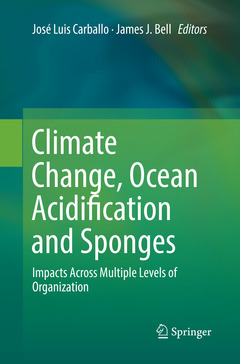Description
Climate Change, Ocean Acidification and Sponges, Softcover reprint of the original 1st ed. 2017
Impacts Across Multiple Levels of Organization
Coordinators: Carballo José Luis, Bell James J.
Language: English
Subjects for Climate Change, Ocean Acidification and Sponges:
Publication date: 08-2018
Support: Print on demand
Publication date: 11-2017
Support: Print on demand
Description
/li>Contents
/li>Biography
/li>Comment
/li>
While sponges represent a very simple group of organisms, which are represented by over 8000 species, there is considerable interest in the increasing role they may play in future marine ecosystems. While we still have a comparatively limited understanding of how sponges will respond to ocean warming and acidification there is evidence that some species may have the ability to acclimate or even adapt to these stressors. This comprehensive collection of articles describes our current understanding of the impacts of ocean acidification and warming on sponges across multiple levels of biological organisation, and from the geological past to the present. With expert contributions from across the world this book represents the most up-to-date view on sponge responses to climate change. This book will be of interest to a wide audience of marine scientists and managers, who are grappling with how to manage, conserve and protect marine ecosystems.
Dr. Jose Luis Carballo is a Senior Researcher and Professor of the postgraduate program in Marine Ecology at the Institute of Marine Science and Limnology at Universidad Nacional Autonóma de Mexico. (UNAM). He received his doctorate in Zoology in 1994 (Sevilla University) obtaining Cum Laude with the Thesis Sponges from the Strait of Gibraltar and after that obtained a postdoctoral Research Fellow on Research and Development. Currently is Senior Researcher in the UNAM, where he has published more than 100 scientific research papers, books, invited major review chapters which have been cited more than 1,800 times (Google Scholar). He has also successfully supervised to completion more than 40 postgraduate (MS and PhD thesis) and Postdoctoral research fellows who research focused mainly in the study of taxonomy, biology an ecology of marine sponges. His current research interests focus mainly in coral reef sponges, and especially in boring sponges, on topics ranging from taxonomy, distribution, reproduction and dispersion. He is also interested in the general broad-scale variability in bioeroder communities and rates of erosion in Mexican Pacific coral reefs, and to understand how climate change and ocean acidification will influence bioerosion distribution and abundance of boring sponges.
Dr James J. Bell is an Associate Professor in marine biology and programme director from the School of Biological Sciences at Victoria University of Wellington in New Zealand. He received his undergraduate degree in marine biology in 1998 from Bangor University (1st Class hons), and his doctorate in 2001 from University College Cork (Ireland). Following his PhD, he held lectureship positions at Reading and Aberystwyth Universities (UK), and started at Victoria University in 2006. To date, Dr Bell has published over the 100 scientific articles in peer-reviewed journals and books, the majority of which are on sponge ecology. He has supervised over 50 honours, M
There is no other book dealing with the response of sponges to climate change and ocean acidification
The book will include the more recent scientific research studies based on a wide range of approaches
Books have been written on other animal groups but not for sponges so there is a gap in the current literature




